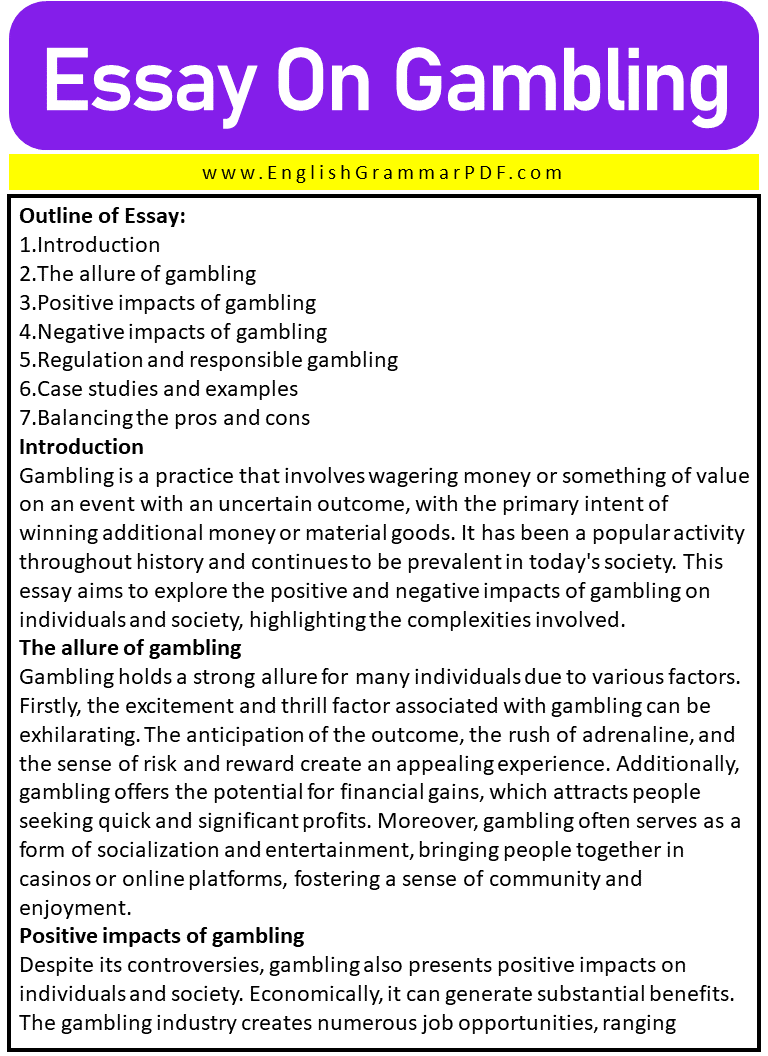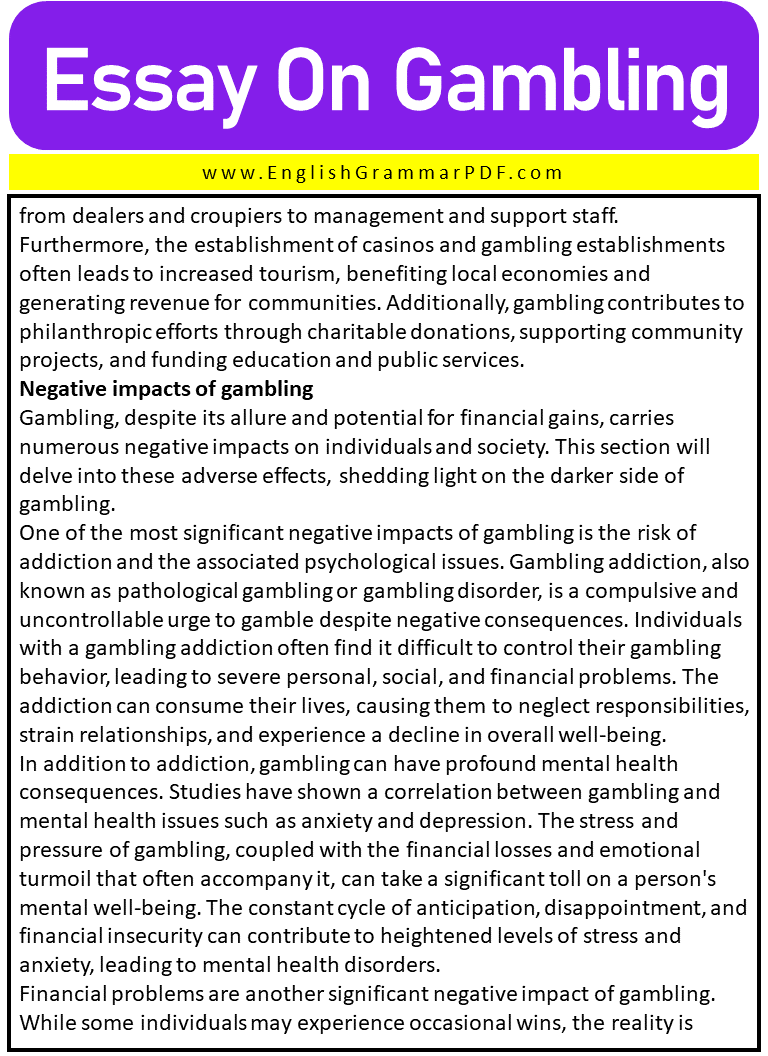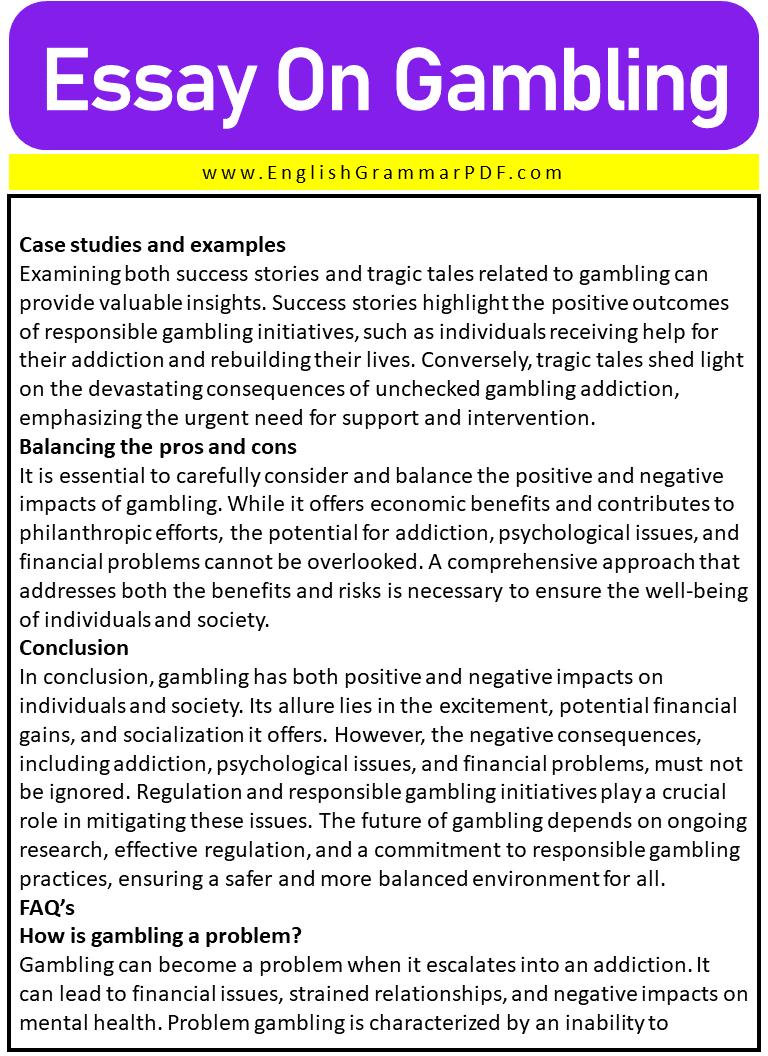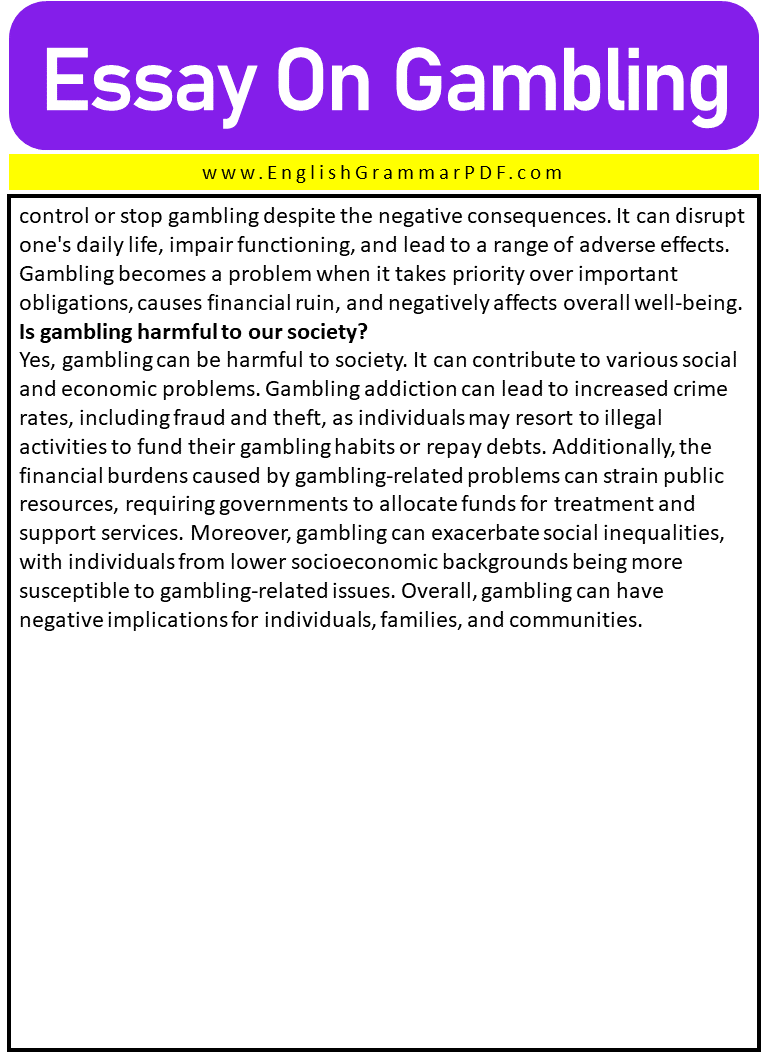Essay On Gambling
Outline of Essay:
- Introduction
- The allure of gambling
- Positive impacts of gambling
- Negative impacts of gambling
- Regulation and responsible gambling
- Case studies and examples
- Balancing the pros and cons
Introduction
Gambling is a practice that involves wagering money or something of value on an event with an uncertain outcome, with the primary intent of winning additional money or material goods. It has been a popular activity throughout history and continues to be prevalent in today’s society. This essay aims to explore the positive and negative impacts of gambling on individuals and society, highlighting the complexities involved.
The allure of gambling
Gambling holds a strong allure for many individuals due to various factors. Firstly, the excitement and thrill factor associated with gambling can be exhilarating. The anticipation of the outcome, the rush of adrenaline, and the sense of risk and reward create an appealing experience. Additionally, gambling offers the potential for financial gains, which attracts people seeking quick and significant profits. Moreover, gambling often serves as a form of socialization and entertainment, bringing people together in casinos or online platforms, fostering a sense of community and enjoyment.
Positive impacts of gambling
Despite its controversies, gambling also presents positive impacts on individuals and society. Economically, it can generate substantial benefits. The gambling industry creates numerous job opportunities, ranging from dealers and croupiers to management and support staff. Furthermore, the establishment of casinos and gambling establishments often leads to increased tourism, benefiting local economies and generating revenue for communities. Additionally, gambling contributes to philanthropic efforts through charitable donations, supporting community projects, and funding education and public services.
Negative impacts of gambling
Gambling, despite its allure and potential for financial gains, carries numerous negative impacts on individuals and society. This section will delve into these adverse effects, shedding light on the darker side of gambling.
One of the most significant negative impacts of gambling is the risk of addiction and the associated psychological issues. Gambling addiction, also known as pathological gambling or gambling disorder, is a compulsive and uncontrollable urge to gamble despite negative consequences. Individuals with a gambling addiction often find it difficult to control their gambling behavior, leading to severe personal, social, and financial problems. The addiction can consume their lives, causing them to neglect responsibilities, strain relationships, and experience a decline in overall well-being.
In addition to addiction, gambling can have profound mental health consequences. Studies have shown a correlation between gambling and mental health issues such as anxiety and depression. The stress and pressure of gambling, coupled with the financial losses and emotional turmoil that often accompany it, can take a significant toll on a person’s mental well-being. The constant cycle of anticipation, disappointment, and financial insecurity can contribute to heightened levels of stress and anxiety, leading to mental health disorders.
Financial problems are another significant negative impact of gambling. While some individuals may experience occasional wins, the reality is that most people lose money through gambling. This can lead to financial ruin, debt, and economic instability. Individuals may resort to borrowing money, selling assets, or engaging in illegal activities to fund their gambling habits or recoup their losses, exacerbating their financial troubles. Moreover, the financial strain caused by gambling can have a ripple effect on personal relationships and family dynamics, leading to conflicts, mistrust, and even the breakdown of relationships.
The negative impacts of gambling extend beyond the individual to society as a whole. Gambling-related crimes, such as fraud, embezzlement, and theft, can increase as individuals become desperate to fund their gambling addiction or repay debts. Moreover, the financial burdens resulting from gambling-related problems can place a strain on public resources. Governments may need to allocate funds to address the social and economic consequences of gambling addiction, including providing treatment services and support for affected individuals and their families.
Furthermore, gambling can contribute to social inequality. Studies have shown that individuals from lower socioeconomic backgrounds are more likely to experience gambling-related problems. They may view gambling as a potential escape from their financial struggles, hoping to improve their circumstances through a stroke of luck. However, this often leads to a cycle of further financial hardship and exacerbates existing inequalities.
Regulation and responsible gambling
To mitigate the negative impacts of gambling, regulation and responsible gambling initiatives are crucial. Governments play a vital role in regulating the industry through licensing and regulatory bodies. These measures ensure fair play, consumer protection, and the prevention of underage gambling. Additionally, responsible gambling initiatives focus on educating the public about the risks associated with gambling, promoting awareness, and providing support services for problem gamblers and their families.
Case studies and examples
Examining both success stories and tragic tales related to gambling can provide valuable insights. Success stories highlight the positive outcomes of responsible gambling initiatives, such as individuals receiving help for their addiction and rebuilding their lives. Conversely, tragic tales shed light on the devastating consequences of unchecked gambling addiction, emphasizing the urgent need for support and intervention.
Balancing the pros and cons
It is essential to carefully consider and balance the positive and negative impacts of gambling. While it offers economic benefits and contributes to philanthropic efforts, the potential for addiction, psychological issues, and financial problems cannot be overlooked. A comprehensive approach that addresses both the benefits and risks is necessary to ensure the well-being of individuals and society.
Conclusion
In conclusion, gambling has both positive and negative impacts on individuals and society. Its allure lies in the excitement, potential financial gains, and socialization it offers. However, the negative consequences, including addiction, psychological issues, and financial problems, must not be ignored. Regulation and responsible gambling initiatives play a crucial role in mitigating these issues. The future of gambling depends on ongoing research, effective regulation, and a commitment to responsible gambling practices, ensuring a safer and more balanced environment for all.
FAQ’s
How is gambling a problem?
Gambling can become a problem when it escalates into an addiction. It can lead to financial issues, strained relationships, and negative impacts on mental health. Problem gambling is characterized by an inability to control or stop gambling despite the negative consequences. It can disrupt one’s daily life, impair functioning, and lead to a range of adverse effects. Gambling becomes a problem when it takes priority over important obligations, causes financial ruin, and negatively affects overall well-being.
Is gambling harmful to our society?
Yes, gambling can be harmful to society. It can contribute to various social and economic problems. Gambling addiction can lead to increased crime rates, including fraud and theft, as individuals may resort to illegal activities to fund their gambling habits or repay debts. Additionally, the financial burdens caused by gambling-related problems can strain public resources, requiring governments to allocate funds for treatment and support services. Moreover, gambling can exacerbate social inequalities, with individuals from lower socioeconomic backgrounds being more susceptible to gambling-related issues. Overall, gambling can have negative implications for individuals, families, and communities.
Explore More Essays:
Download the PDF of Essay








